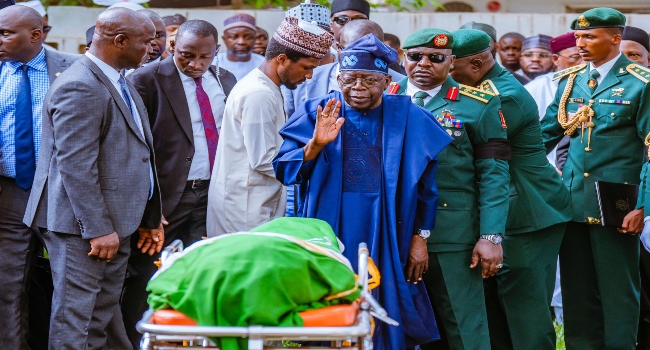The grandson of Shehu Shagari, the former president of Nigeria, Nura Muhammad Mahe, has said that late President Muhammadu Buhari handled Shagari’s death and funeral in 2018 with “little respect.”
Mahe compared Buhari’s actions to those of President Bola Tinubu in a statement issued on Wednesday. He praised Tinubu for hosting a state funeral for Buhari, who passed away on Sunday, July 13, and was buried in Daura on Tuesday with full military honors.
Mahe called President Tinubu’s inauguration of a high-level national burial committee and his personal attendance at Buhari’s funeral “a gesture of honor and a symbol of national unity.”
“The treatment of the late President Shehu Shagari during the Muhammadu Buhari administration is in sharp contrast to this,” he stated.
He commended Tinubu’s action, saying it was appropriate for a former head of state and served as a reminder of how the country should respect its leaders despite historical political disagreements.
Read Also: Atiku Gone, Peter Obi Should Come Back to PDP – Fayose
Mahe reflected on Shagari’s death in December 2018, noting that Buhari, who was in the nation at the time, did not have a state burial for his predecessor or attend the funeral.
He claimed that a government delegation headed by Boss Mustapha, the then-secretary to the government of the federation and a notable non-Muslim, was sent to speak on his behalf.
He maintained that such a strategy demonstrated a “lack of empathy and decorum,” especially in light of Shagari’s historic status as Nigeria’s first Executive President to be elected democratically.
“The fact that Shagari was killed at the hands of a man who many believe harbored political resentment toward him is still a painful memory,” Mahe bemoaned.
“Even in his final moments, Buhari displayed little respect or public regret for his predecessor.”
Mahe urged the country to rise above political differences in death and concluded by praying for Nigeria’s former leaders.
“May Allah grant eternal rest and forgiveness to all of our former leaders.” “Whether they are praised or criticized, their legacies are still a part of our history as a country,” he continued.



